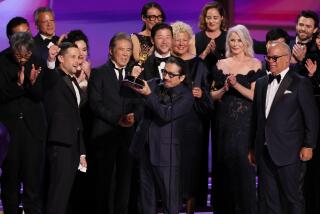Anime Series Draws on a World of Alienation
- Share via
Since its debut in 1995, Hideaki Anno’s “Shinseiki Evangelion” (Neon Genesis Evangelion) has remained one of the most popular, influential and controversial series in the history of Japanese animation.
The television series and subsequent features have earned more than $800 million in video sales and an additional $400 million in sales of related merchandise. More than 800 Web sites in 12 languages are devoted to “Evangelion” and, on a typical day, EBay may offer 1,000 related items.
The eight-disc “Perfect Collection” (A.D. Vision, $170) presents the entire 26-episode series in a noteworthy English dub.
“Evangelion” (pronounced ee-van-GEL-ion, with a hard “G”) is derived from the German evangelium, which refers to the Christian Gospels but is also slang for absolute truth. Anno’s watershed series was not the first anime series to combine giant robots with apocalyptic Christian symbols and elements of Jungian psychology, but it did so with exceptional panache. It’s an intriguing and sophisticated work, utterly unlike any American animated film.
The story unfolds in 2015, 15 years after the Second Impact, a cataclysmic explosion in Antarctica that devastated much of the Earth.
Although reported as a meteor strike, the explosion was caused by a human encounter with Adam, the first of the powerful, sentient creatures known as Angels to appear on Earth. The Angels are now attacking the planet, and the defense of Earth rests with the secret U.N. agency NERV. The only effective weapon against the Angels are the Evas (short for “Evangelions”), NERV’s enormous cyborg robot-suits piloted by psychic teenagers. The most effective pilot is 14-year-old Shinji Ikari (voice by Spike Spencer, in an exceptional performance), the alienated son of icy NERV Commander Gendo Ikari (Tristan MacAvery).
Unlike the brawling hunks in “Dragon Ball Z” or the grimly dedicated warriors in “Gundam Wing,” Shinji is a repressed and reluctant hero. While he attempts to resolve the conflicted relationship with his remote father, he befriends another pilot, Rei Ayanami (Amanda Winn), and is essentially adopted by NERV officer Misato Katsuragi (Allison Keith), who conceals deep emotional wounds beneath a bubbly exterior.
Shortly before the debut of “Evangelion,” Anno wrote in the magazine “Anime FX” that his lead characters “are both afraid of being hurt. They might both be thought of as being unsuited to be heroes, lacking the strength of self that marks such a person. And yet I made them the heroes.” But those weaknesses give them a depth and humanity many anime characters lack.
“Evangelion” includes some terrific action sequences: In one episode, Shinji and another pilot defeat a humanoid Angel by synchronizing their Evas in a combination of gymnastics and karate movements. But the focus of the series remains the characters’ alienation and disillusionment. Shinji’s victories don’t bring him the happiness and satisfaction heroes normally achieve: Overcome by the strain of fighting the Angels and the revelations of his commanders’ duplicity, his ego implodes. The series ends in a long collage of flashbacks and still artwork, accompanied by a protracted internal dialogue between Shinji and the other characters as he conceives them.
These profoundly unsettling episodes suggest animated schizophrenia and recall the chilling conclusion of Yukio Mishima’s “Sea of Fertility” tetralogy, in which the main character realizes he can no longer be certain of his own existence. Both works offer a desolate vision of a universe in which no answers exist--in this life or any other.
Almost as soon as they were broadcast, the final episodes of “Evangelion” became the subject of heated discussions that show no signs of abating. Some viewers hailed them as profound; detractors replied that their meaning was more apparent than real. Anno wrote that he created “Evangelion” after four years of severe depression when he was “a wreck, unable to do anything,” adding that “the story has not yet ended in my mind. I don’t know what will become of Shinji or Misato, or where they will go.”
Much of the story was reworked in the theatrical feature “Death and Rebirth” (1997); the second film, “End of Evangelion” (1997), offered a new and more violent finale.
Manga Entertainment will release “Death and Rebirth” on DVD on June 25, with “End of Evangelion” to follow Sept. 24, enabling American viewers to decide which ending they feel is the appropriate one--which will probably lead to the creation of more Web sites and further debate and discussion.
More to Read
The biggest entertainment stories
Get our big stories about Hollywood, film, television, music, arts, culture and more right in your inbox as soon as they publish.
You may occasionally receive promotional content from the Los Angeles Times.










